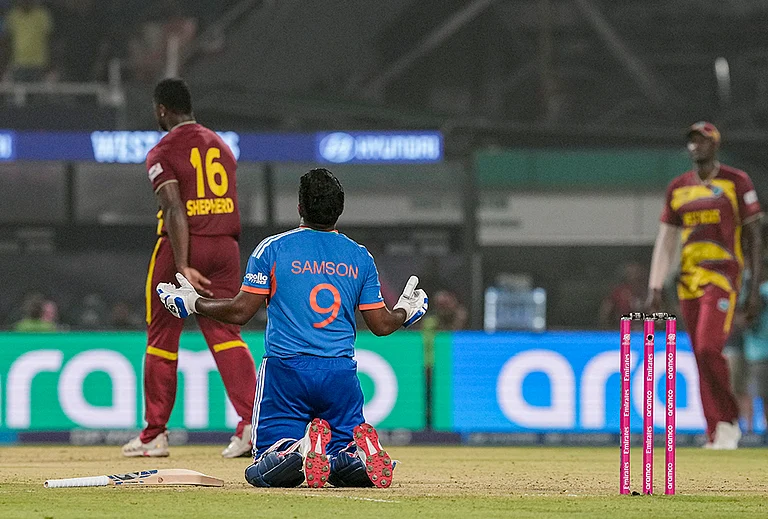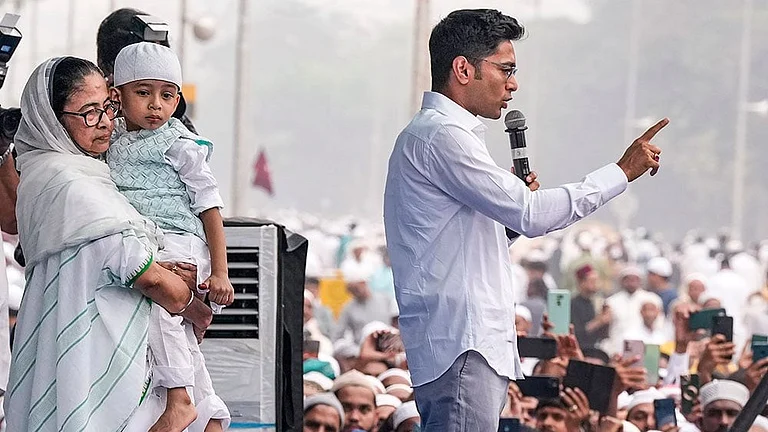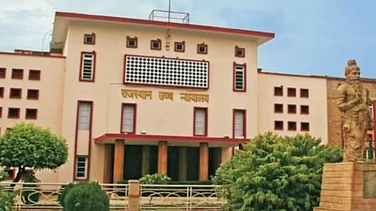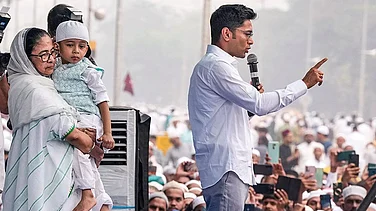It is difficult to say if the ruling BJP in Karnataka fought the just-concluded Assembly Election on its own strength or if it managed its weaknesses by fighting the election. If the saffron party had a bumpy ride in its southern gateway so far, the future appears even bumpier, regardless of the outcome of the election.
The story of the BJP’s growth in Karnataka, the only southern state where it could capture power so far, is the story of growth with instability. On one level, its vote share has kept increasing since 1991 but at the same time, it has struggled to put together a durable support base either through its ideology or through its record of performance when in power. Nearly a quarter of a century, after its ascendancy began in Karnataka, the party in this election, had no leader to project, no issue to flag, and no record of good governance to claim. Prime Minister Narendra Modi had to literally take over the campaign but in resorting to this strategy, the party ended up admitting that it had no strength of its own in the state to draw on.
This is the first election in which the BJP did not project its candidate for the chief minister’s post. It is expected of a party in power to showcase its incumbent chief minister as the face of its campaign, but Chief Minister Basavaraj Bommai remained a fringe player. So was former Chief Minister BS Yediyurappa who was earlier side-lined but was later placated and brought back to be a part of the campaign. The 80-year-old leader was present more as a grand Lingayat patriarch than a future leader of the party. When the BJP faced allegations of ‘using and throwing away’ Lingayat leaders in the aftermath of the exit of senior leaders such as Jagadish Shettar and Laxman Savadi who were denied renomination to contest the election, the BJP’s State President announced that the party would make a Lingayat leader the Chief Minister should it win again. However, it soon realised the potential damage this statement could cause, forcing Home Minister Amit Shah to clarify that no such decision was taken, and the party needed the support of all castes and communities. No doubt the BJP now commands the support of a broader social coalition but the pace at which the party took root in the complex socio-political structure of the state has been surprisingly slow for a party that is known for its fast-paced politics elsewhere. There seems to be some inherent contradiction between what the BJP stands for and the social milieu of Karnataka.
In the run-up to the elections, it appeared that the BJP was in a dilemma about its image as a party primarily backed by the Lingayats. While it cannot do without the continued support of this community, pushing this perception further could cost it the support of others. But in the absence of such a push, the politically ambitious community of the Lingayats would stop its patronage of the party.
The BJP has another worry in relying too much on the Lingayats. For the party, courting the Lingayats is like fraternising with its ideological enemy. The Lingayats are a sect that is founded on anti-Brahminical/Vedic philosophy. Despite the BJP’s best efforts to ‘Hindu-ise’ the Lingayats with considerable success, the community has strong voices that challenge the party’s Hindutva ideology. The party may continue to saffronise ordinary Lingayat voters but Saint Basaveshwara, who founded the Lingayat sect, remains a prominent symbol of anti-Hindutva politics. As long as its reliance on the Lingayats persists, the BJP cannot push hardline Hindutva too far.
The desperate attempt of the BJP to cultivate the rival Vokkaliga community of Southern Karnataka this time was also not just for winning a few additional seats. The BJP knows that the more inroads it makes into the Vokkaliga hearts, and heartland, the more it would be perceived as a pan-Karnataka party and the less would be its reliance on the Lingayats. Moreover, if it can establish its hold over both the Lingayats and the Vokkaligas, it would be that much easier for the BJP to command the support of the OBCs and SC/STs as sections of these communities continue to depend on the large patronage network that the leaders of these two dominant communities still maintain.
The BJP seems to think that once the nonagenarian former Prime Minister HD Deve Gowda moves away from old Mysuru politics, it can step into the shoes of the Janata Dal (Secular) and beat the Congress at its own game in this region. The party has invested heavily here even when its prospects looked bleak in most of the 61 seats that constitute the Vokkaliga heartland. However, the politics of Hindutva is unlikely to go unchallenged here as well. The Vokkaligas are at the forefront of the Kannada movement, and they are sensitive to the BJP’s politics of stifling subnational sentiments. Celebrated Kannada poet Kuvempu, whom the Vokkaligas consider as an icon, inspired generations of youth to resist the dominance of Brahminical Hinduism. This time, the BJP even tried to popularise two fictitious Vokkaliga warriors as having killed Tipu Sultan, the erstwhile Muslim ruler of Mysore, in a bid to turn the Vokkaligas against the Muslims. This prompted a stern intervention by Nirmalananda Swami, the head of the Vokkaliga mutt (monastery), when he asked the BJP leaders to stop propagating fiction as history. Nanjavadhuta Swami, the head of another Vokkaliga mutt, was unequivocal in his disapproval of the Bommai Government scrapping reservation for Muslims to increase it for the Vokkaligas. ‘We do not need it (increase in reservation) if you are giving it to us by snatching it from someone else’, the Vokkaliga seer was seen saying in a widely shared video clip.
Karnataka is a land of movements. The first non-Congress Government in the state came to power in 1983, riding on the mobilisation that followed the Dalit movement, the farmers’ movement, and the Kannada language movement. These movements have remained dormant and scattered but the rise of Hindutva and the centralisation trends and an authoritarian streak under the BJP’s rule may lead to their revival. This time, several Dalit factions regrouped two months before the election to galvanise Dalit voters against the BJP. The BJP responded by making an election-eve announcement increasing the quantum of SC/ST reservation. Dalit leaders saw the quota hike as an election ploy and highlighted the BJP’s characteristic antagonism to the reservation policy.
As for the farmers’ movement, it saw some re-activation on the question of the centre’s farm laws, which have not been revoked in Karnataka. On the linguistic front, Kannada activists have been raising their voices, on and off, against the imposition of Hindi and the very idea of the ‘double-engine government’ which activists consider as a threat held out by the centre not to cooperate with the state if the people elected a non-BJP government.
In addition to these traditional resistance movements, this election also saw several civil society organisations coming together under the banner of “Eddelu Karnataka” (wake-up Karnataka) to resist the BJP’s communal, economic, and anti-federalism agendas. Any more push from the BJP on any one of these fronts would further consolidate these forces of resistance. At the same time, the inherent contradictions in the BJP’s relationship between the two dominant communities will continue to pose a challenge to its expansion. The BJP needs an alternative mobilisation strategy which is in sync with the idea of Karnataka and centred around a strong state-level leadership. But the current version of the BJP’s nationalistic and personality-centred politics is unlikely to embrace such a strategy.
(Views expressed are personal)
(This appeared in the print as 'Southern Strategy')
A Narayana teaches public policy and governance at Azim Premji University, Bengaluru





















